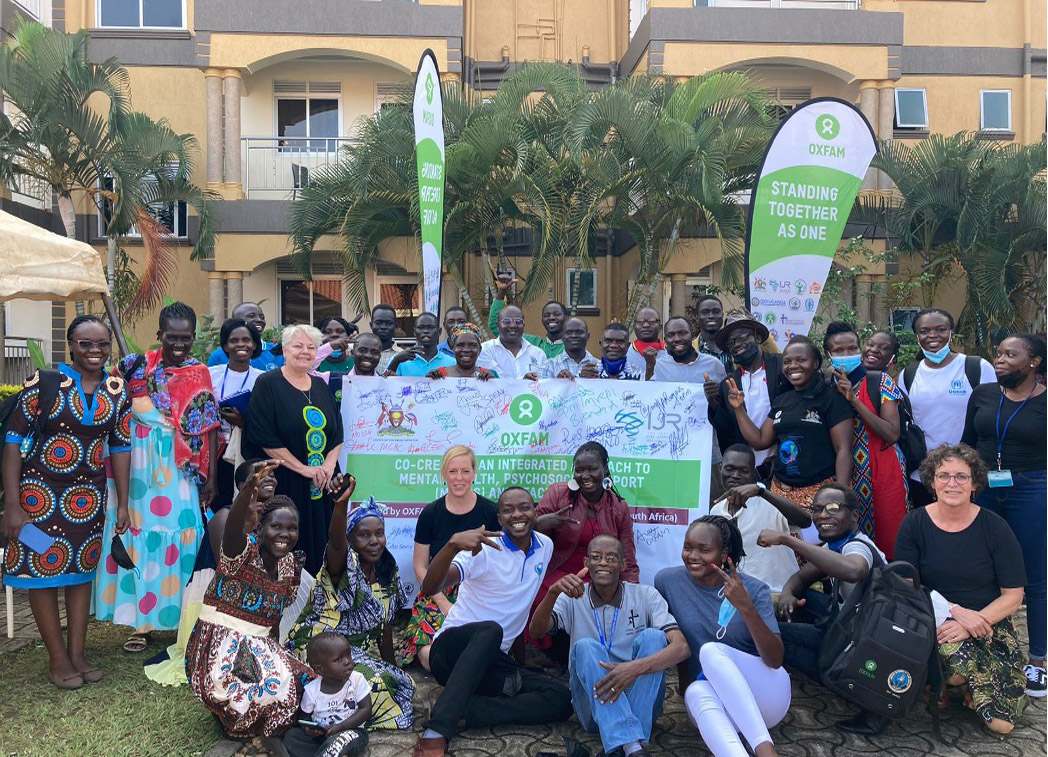Mental health and psycho-social support in peacebuilding: co-creating integration in Arua, Uganda

Image Source: Friederike Bubenzer
Over the last six years, IJR has been leading a research project aimed at narrowing the gap between mental health and psychosocial support (MHPSS) and peacebuilding (PB). This project is based on the premise that war, violent conflict, and its legacies weaken the social fabric that governs relationships and the capacity for recovery.
In 2020 OXFAM approached IJR to explore ways in which IJR might support OXFAM in strengthening its peacebuilding work with mental health and psycho-social support. OXFAM acknowledges that the Covid-19 pandemic (and the broad range of related impacts) is only the most recent phenomenon impacting on the mental health of peacebuilders and on the communities they serve. This has reinforced the need to look more systematically at supporting OXFAM’s partners doing community level peacebuilding work in northern Uganda and South Sudan. In early November, a three-day participatory generative workshop was co-hosted by IJR and OXFAM in Arua, Uganda to deepen understanding of how organisations currently working in the field of mental health and psychosocial support (MHPSS) and/or peacebuilding (PB) in northern Uganda, could work closer together to enhance their programme outcomes.
The workshop brought together individuals representing OXFAMs community-based refugee-led partner organisations and mental health and psychosocial support professionals based in and working in refugee settlements in northern Uganda. The aim was to jointly explore how an integrated approach between these two fields might be conceptualised and rolled out in practice.
In its extensive deliberations about how best to operationalise an integrated approach for the two fields, IJR developed a methodology which brings together professionals from both fields to jointly articulate how best to integrate the theories and tools towards an integrated methodology. Co-creation workshops with representation of both fields have taken place in South Africa (January 2019), Kenya (March 2019) and Zimbabwe (September 2019). Due to COVID-19 restrictions the follow-up series of co-creation workshops were done on-line a year later with each of the countries over a three-week period. The aim of the co-creation workshops within the broader project is to contribute to the projects’ research agenda which aims to find evidence of whether and how linking organisations from both fields together, in a specific context-so that they are working together in an integrated way from the outset- will increase the psychosocial well-being of individuals and communities with the aim of achieving sustainable peace. In order to test this hypothesis, an ‘integrated approach and methodology’ needs to be conceptualised, developed, and implemented. If there is more peace of mind there will be better project and programme outcomes.
The selection of participants for the workshop was deliberate and considered. It sought to ensure that the integration of MHPSS and peacebuilding could be done from the onset. This meant that not only the peacebuilding organisations supported by OXFAM were included but also organisations from the mental health and psychosocial support field. A small group of community leaders also attended and added important contextual understanding and nuance. Finally, the office of the Prime Minister (OPM) was invited to join to ensure that this important institution, which plays a key coordinating and oversight role, could learn from other participants and from part of the process.
After an in-depth getting-to-know-one another process, participants from both fields worked in teams comprising their primary profession to define their work, goals, and tools for one another. By exploring the commonalities between the fields, it became clear that the two fields do not only have the same end goals but often use similar tools in different ways to achieve these goals.
The participants contributed and participated very actively throughout the three-day workshop. The participants evaluated the workshop content and methodology as being effective for the subject matter at hand and successful in maximising participation and co-creation. Many participants said they were inspired to continue the process. As a result of the level of participation and commitment, the calibre and variety of participants; the facilitators found the workshop to be of exceptionally high standard. A strong foundation has been laid for OXFAM to lead the way in northern Uganda to integrate MHPSS into peacebuilding with the aim of strengthening the outcomes of both fields.
Friederike Bubenzer, Senior Project leader in Peacebuilding Interventions Programme
